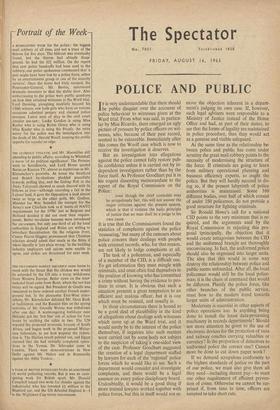POLICE AND PUBLIC
IT is very understandable that there should be public disquiet over the accounts of police behaviour to witnesses given at the Ward trial. From what was said, in particu- lar by Miss Ricardo, there emerged an ugly picture of pressure by police officers on wit- nesses, who, because of their past record, seemed to be vulnerable. Immediately after this comes the Woolf case which is now to receive the investigation it deserves.
But an investigation into allegations against the police cannot fully restore pub- lic confidence unless it is carried out by in- dependent investigators rather than by the force itself. As Professor Goodhart put it in his cogent dissenting memorandum to the report of the Royal Commission on the Police:
. . . even though the chief constable may be scrupulously fair, this will not answer the major criticism against the present system, which is that it violates the basic principle of justice that no man shall be a judge in his own cause.
It is true that the Commissioners found the statistics of complaints against the police 'reassuring,' but many of the rumours about police concern their dealings with people with criminal records, who, for that reason, are not likely to lodge complaints at all.
The task of a policeman, and especially of a member of the CID, is a difficult one. To get information they must mingle with criminals, and must often find themselves in the position of knowing who has committed a crime without having the evidence to pro- duce in court. It is obvious that such a situation presents a great temptation to an efficient and zealous officer, but it is one which must be resisted, and usually is.
In these circumstances there is bound to be a good deal of plausibility in the kind of allegations about dealings with witnesses which came up at the Ward trial, and it would surely be to the interest of the police themselves, if inquiries into such matters were carried out by some body not subject to the suspicion of taking a one-sided view of the case. Professor Goodhart suggested the creation of a legal department staffed by lawyers for each of the 'regional' police forces which he would like to see. Such a department would consider and investigate complaints, and there would be a legal assessor on every police disciplinary board. Undoubtedly, it would be a good thing if more trained lawyers worked together with police forces, but this in itself would not re- move the objection inherent in a depart- ment's judging its own case. If, however, such legal ailvisers were responsible to a Ministry of Justice instead of the Home Office and had, as part of their duties, to see that the'forms of legality are maintained in police procedure, then they would act as a genuine and visible safeguard.
At the same time as the relationship be- tween police and public has come under scrutiny the great mail robbery points to the necessity of modernising the structure of the force. If criminals are going to learn from military operational planning and business efficiency experts, so ought the police. But they will hardly succeed in do- ing so, if the present labyrinth of police authorities is maintained. Some 160 different bodies, over half of which consist of under 350 policemen, do not provide a good structure for fighting criminals.
Sir Ronald Howe's call for a national CID points to the very minimum that is re- quired, and the arguments used by the Royal Commission in rejecting this pro- posal (principally, the objection that it would create antagonism between the CID and the uniformed bran9h) are thoroughly unconvincing. In fact, the uniformed police should also be organised into larger units. The idea that this would in some way destroy the relationship between police and public seems unfounded. After all, the-local policeman would still be the local police- man; it is the chain of command that would be different.. Plainly the police force, like other branches of the public service, must bow to the modern trend towards larger units of administration.
Modernity is essential in other aspects of police operations too. Is anything being done to install the latest data-processing machinery in records departments? Should not more attention be given to the use of electronic devices for the protection of vans and railway coaches carrying valuables or currency? Is the proportion of detectives to uniformed police the correct one? Cannot more be done to cut down paper work?
If we demand scrupulous conformity to the highest standards of justice on the part of our -police, we must also give them all they need—including decent pay—to meet our other requirement of efficient preven- tion of crime. Otherwise we cannot be sur- prised if, from time to time, officers are tempted to take short cuts.






























 Previous page
Previous page